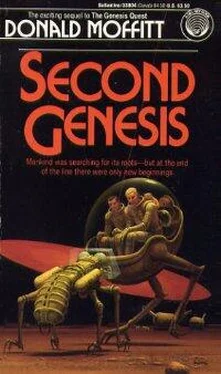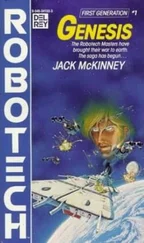“And on our way out of the galaxy,” Trist said, “if our gamma’s up to what you say it’s going to be, we’ll have a Message cycle of close to four thousand years. With the tail out of range of the head.”
“It’s probably moot at this point, anyway,” Jao said. “If there’s other life in the galaxy, we wouldn’t find it this close to the center. Too much radiation in these skies. If we have managed to seed the galaxy with secondhand Nar, we must have done it farther out, with the unabridged Message.”
He cocked his head as a happy thought occurred to him. “That might have been forty or fifty thousand years ago, as the galaxy ticks. They might already have spread like crazy from thousand of foci. They wouldn’t have been too far behind the Father World—hell, they started with a technological civilization! And they’d know their progenitors were only a galactic blink away, waiting to embrace them with all five arms—not like us poor spawn of a vanished species! What an incentive! By now they’d have met, merged. And when we burrow out of this nest of stars, we’ll be traveling through a solid pavement of Nar.”
“Don’t get carried away,” Trist said dryly. “Our lateral transmissions cut a swath that’s only a few thousand light-years wide. The message has probably swept about two percent of the stars in this galaxy. That’s a lot of stars, but it’s hardly at the saturation point.”
Jao waved his arms impatiently. “What are you talking about? With the effective diameter of the phased array in the crown and all the power we’ve got to play with, we can beam to the opposite edge of the galaxy.”
“If we could cut through the dust clouds,” Trist said patiently. “But that’s not the point. For each cycle of the Message, I try to aim the lateral beams at some thick cluster of stars a couple of thousand light-years away and hold them there while I compensate for the changing Doppler. By the time the beam spreads much beyond that, any civilization that’s searching for intelligent signals starts getting smaller and smaller cross sections of the Message. You reach the point where you get a thin slice that doesn’t look like an intelligent signal. And even if you suspect that it is, you scan and you get other thin slices that you can’t put together.”
Jao gave Bram a disgruntled look. “Any advanced civilization doing a sky search would run a continuous survey if they’re worth their salt. They’d sweep up and down the spectrum and run a computer program to put it all together.”
“Maybe,” Trist said.
Jao brightened. “Look at it this way. Two percent of the stars in this galaxy comes to—what—four billion stars. Say two percent of those have planets with conditions that support life—”
“Don’t get reckless,” Trist said.
“Two percent,” Jao said firmly. “All right, that’s eighty million target stars. And say that one -tenth of one percent of them have advanced societies with a little genetic engineering capability and a normal amount of curiosity.”
“How about one one-thousandth of one percent?” Trist suggested mildly.
“Sure. Why not? I won’t quibble. I’m a very unimaginative guy. That makes eight hundred little Nar factories. Hell, make it one ten-thousandth of one percent! We’re still in business!”
“It only has to happen once,” Bram said. “Once out of those four billion stars we’ve touched. Those are the odds the Nar were willing to settle for. They knew it could happen. It happened once with Original Man.”
“More than once, maybe,” Trist suggested.
“That’s a thought!” Bram laughed.
“On the way out of the galaxy,” Trist said, “how about using the phased array in eavesdropping mode for a few thousand years between Message cycles? See what may have developed.”
“It’s all right with me,” Bram said. “But you’d better take it up with the next year-captain.”
“That might be Smeth. He’s campaigning already. He’s concentrating on the new crop of voters this time. He’s got them hornswoggled. The young ones flock around him to listen to his tales of the good old days, when a small band of dedicated humans under his guidance as chairman of the physics department ran the Father World and decided to initiate a grand project to return humankind to its home in the Milky Way.”
“He asked for my vote,” Bram said.
“What did you tell him?”
“I said he could have it.”
Jao, impatient at the digression, had perked up his ears at the mention of eavesdropping mode.
“Yah,” he said. “Good idea. See what intelligent transmissions we pick up. Plug in a program to look for the patterns of touch-reader transmissions. That way we know they’re Nar. You know, even if there’s no other intelligent life in the galaxy and this whole errand was a flop, the Nar must’ve spread over a sphere of a couple of thousand light-years by now, anyway. Hey, in the last fifty thousand years, maybe they sent more message probes after us. Maybe one with a second human crew. If they’ve developed a better drive and were willing to boost at slightly over one gravity, maybe they’re ahead of us. Maybe we’ll find them waiting for us in the Milky Way with a million years of civilization behind them, Or maybe the Nar have been spreading themselves at the edge of lightspeed! Why not? A few thousand years of developing the hadronic photon drive and it might be cheap enough for colony ships. Who needs probes? Who needs errandpersons? At one and a tenth g’s, they could already have settled an arc of space with its leading edge ahead of us.” He looked around wildly. “They could be all around us right now!”
“Don’t get carried away,” Trist said. “Next you’ll have them traveling faster than light.”
“Faster than light? Why not? Einstein is as Einstein does. The Nar arrived at their relativity by a different route. Maybe we humans missed something. You know, for the Nar, mathematics is a sensory experience. They count with the surface of their bodies. Whole digital operations, faster than you can whistle. They can plug as many Nar into a problem as they want—subunits, everything — and feel their way to a solution. Who’s to say they haven’t tackled the faster-than-light problem?”
“Here’s where he drags out the tachyons,” Trist said with a tolerant smile at Bram.
“Go ahead, laugh, but they could’ve reached the other side of the galaxy by now,” Jao insisted.
“If you’re still beating the dead carcass of your Klein universe with its inside-out tachyons, I thought we settled that thirty years ago when we ran it through the computer and kept running up against the problems of nonorientability and self-intersection no matter how many dimensions you cared to postulate.”
“We only ran it up to thirteen dimensions,” Jao protested. “We never solved it for a general case.”
Bram intervened to squelch the familiar squabble before it could get started.
“Whatever’s happening out there in the galaxy—whether the Nar really needed us or not, or whether other intelligent life forms exist and the Message got through to one of them, or eighty million of them by now—it doesn’t matter anymore. We’ve done our part of the job. We can go home now.”
Home.
Bram leaned back in his chairpuff and savored the idea of it, as he had done for most of his life. When he had been a small child, it had been bright, real, and immediate. Later it had become an abstraction, an impossibility. The adult Bram had known too much to believe in it. Now it was tangible again.
Читать дальше












